376+ Nonsense Words (Pseudowords) – 6 Free Lists
This post may contain affiliate links. As an Amazon affiliate, we earn from qualifying purchases.
Get 6 lists with 376+ nonsense words, aka pseudowords! The words are organized by syllable type, and they are perfect for practicing decoding, sorting, or even use as a quick assessment! Read all about using nonsense words with your students and grab these 6 free pseudoword lists.
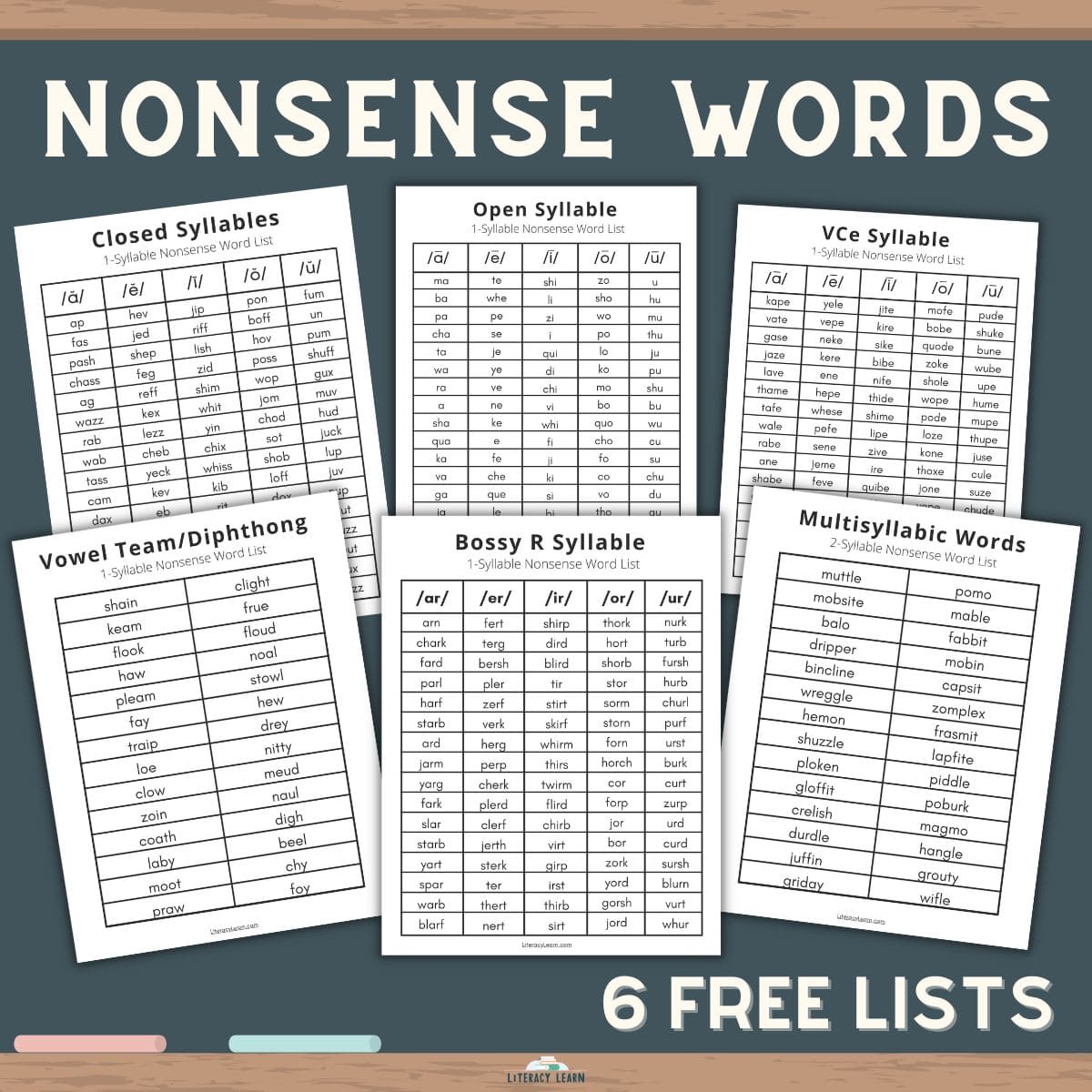
What Are Nonsense Words/Pseudowords?
Pseudo is a Latin base meaning false. A word sum would look like this:
Pseudo (means false) + Word (means word) = Pseudoword (means false word).
We also call pseudowords nonsense words because they aren’t real words – they’re nonsense and have no meaning!
👉 Nonsense words are made up words that follow predictable spelling patterns. Because they follow predictable spelling patterns, they can be decoded!
👨🏽🏫 Why Use Nonsense Words?
Nonsense words give kids explicit practice in reading words and word parts correctly based on the syllable type and spelling pattern they notice in the word.
If you think about it, multisyllabic words are often made up of nonsense syllables! Take the word volcano. It’s a three syllable word made up of 2 nonsense syllables and one real syllable: vol/ca/no.
Why is this important? Explicit practice reading one-syllable nonsense words correctly will help kids correctly decode longer, multisyllabic words!
👉 For more syllable practice, check out our popular Syllable Bundle with anchor charts and practice worksheets!
Nonsense words also give teachers insight into what phonics concepts students have mastered.
For example, let’s say you want to give a CVC or closed syllable word assessment to your students. If you use nonsense words (like fab), students have to decode the word using the knowledge that closed-syllable words have short vowel sounds.
If they read făb as fābe, then you know that students need additional practice with CVC words as they have not mastered the CVC pattern or closed syllable type.
Using real words could skew this information. Because your students have come across many CVC words in text, they are able to recognize some instantly and not necessarily decode them based on the pattern. That means nonsense words can serve as a more valid assessment tool.
Using the Nonsense Word Lists
Use the word lists for practicing decoding, sorting, or even as an assessment!
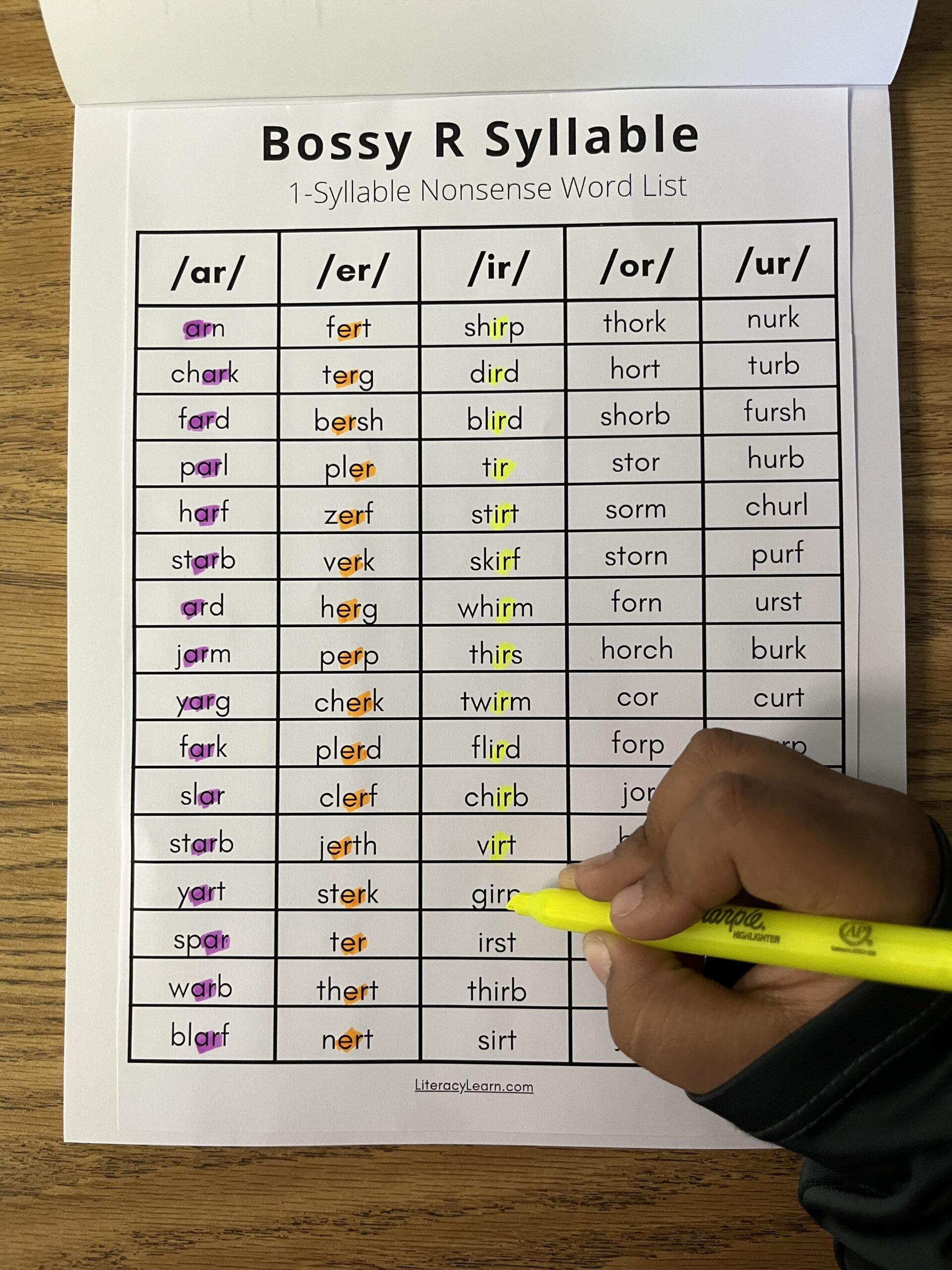
Decoding
Nonsense words are great for decoding practice. Students are forced to rely on phonics features only, not context or familiarity. David Kilpatrick, in his book Equipped for Reading Success (2016), states that using nonsense words “reinforces letter-sound skills and blending.”
This eliminates the ‘guessing work’ that is often associated with balanced literacy.
We want to teach our students the English language has rules, and many words follow predictable patterns that can be decoded.
Sorting
Noticing patterns in words is an important part of reading. Use the words on these lists to sort according to whatever phonics features you’re working on.
You could use as a closed sort where you tell kids the categories for sorting. For example: “We are going to sort nonsense words into open and closed syllables today.”
Or you could use as an open sort where kids have to look for similar patterns or features to determine the categories to sort.
For example, you can give your students a few words from the the Closed Syllable and VCe Syllable list. Kids will have to notice the different patterns in words and should sort accordingly.
👉 Tip: Because these lists include SO many words, we suggest cutting portions of the list and only giving kids a few at a time. This also allows you to practice on multiple occasions, using the same worksheets.
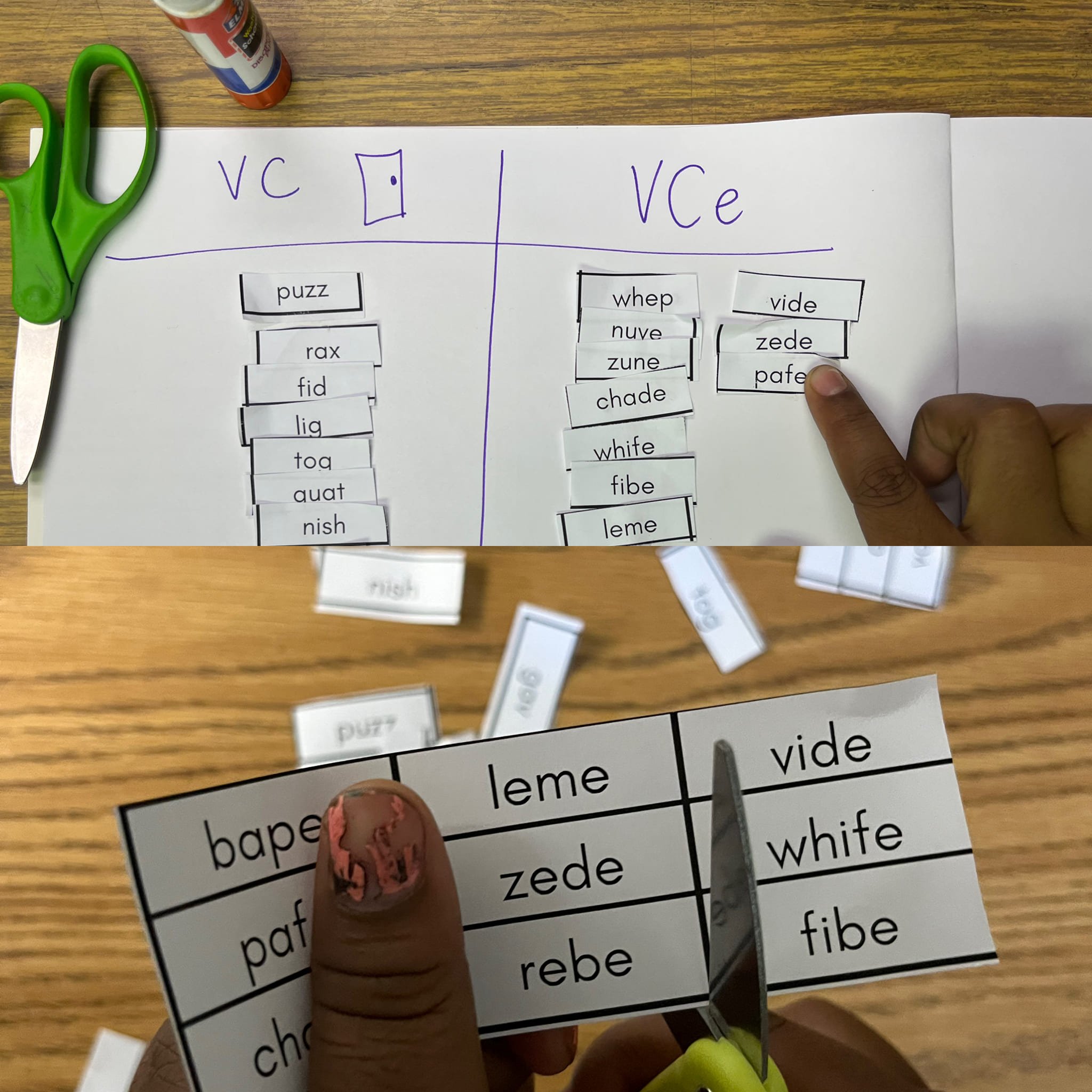
Assessment
Use these lists as a quick, easy, and valid assessment tool. Provide a list to students and ask them to read the words.
You can quickly see if your students know phonics skills, syllable types, and if they can blend those sounds together to read words.
Use these word lists as an informal assessment and have kids quickly read the words. We suggest having them read left to right, since many are organized by vowel sounds.
Nonsense Word Examples
📃 Download the six lists at the bottom of this post. Otherwise, all 376 words are listed out below for you!
Closed Syllable Nonsense Words
| Short A | Short E | Short I | Short O | Short U |
| ap | hev | jip | pon | fum |
| fas | jed | riff | boff | un |
| pash | shep | lish | hov | pum |
| chass | feg | zid | poss | shuff |
| ag | reff | shim | wop | gux |
| wazz | kex | whit | jom | muv |
| rab | lezz | yin | chod | hud |
| wab | cheb | chix | sot | juck |
| tass | yeck | whiss | shob | lup |
| cam | kev | kib | loff | juv |
| dax | eb | rit | dox | nup |
| wad | tep | pish | rom | mut |
| jag | med | yiss | ock | wuzz |
| quat | heff | lig | quot | chut |
| rax | tess | fid | tog | bux |
| gav | whep | nish | wozz | puzz |
👉 For more practice, get our list of 80+ closed syllable words!
Open Syllable Nonsense Words
| Long A | Long E | Long I | Long O | Long U* |
| ma | te | shi | zo | whu |
| be | whe | li | sho | hu |
| pa | pe | zi | wo | mu |
| cha | se | i | po | thu |
| ta | je | qui | lo | ju |
| wa | ye | di | ko | pu |
| ra | ve | chi | mo | shu |
| a | ne | vi | bo | bu |
| sha | ke | whi | quo | wu |
| qua | e | fi | cho | cu |
| ka | fe | ji | fo | su |
| va | che | ki | co | chu |
| ga | que | si | vo | du |
| ja | le | bi | tho | gu |
| la | ze | ni | jo | zu |
| tha | re | thi | yo | nu |
*Remember, long U can say /oo/ or /ū/.
👉 For more practice, get our list of 64+ open syllable words.
VCe (Magic E) Nonsense Words
| Long A | Long E | Long I | Long O | Long U* |
| kape | yele | jite | mofe | pude |
| vate | vepe | kire | bobe | shuke |
| gase | neke | sike | quode | bune |
| jaze | kere | bibe | zoke | wube |
| lave | ene | nife | shole | upe |
| thame | hepe | thide | wope | hume |
| tafe | whese | shime | pode | mupe |
| wale | pefe | lipe | loze | thupe |
| rabe | sene | zive | kone | juse |
| ane | jeme | ire | thoxe | cule |
| shabe | feve | quibe | jone | suze |
| quave | chefe | dile | yope | chude |
| mame | quele | chise | chofe | duve |
| bape | leme | vide | ore | gupe |
| pafe | zede | whife | cote | zune |
| chade | rebe | fibe | vope | nuve |
*Remember, long U can say /oo/ or /ū/
👉 Learn more about the Magic e Syllable type, and for more practice, get our list of 75+ Silent E Words.
R-Controlled Nonsense Words
| AR | ER | IR | OR | UR |
| arn | fert | shirp | thork | nurk |
| chark | terg | dird | hort | turb |
| fard | bersh | blird | shorb | fursh |
| parl | pler | tir | stor | hurb |
| harf | zerf | stirt | sorm | churl |
| starb | verk | skirf | storn | purf |
| ard | herg | whirm | forn | urst |
| jarm | perp | thirs | horch | burk |
| yarg | cherk | twirm | cor | curt |
| fark | plerd | flird | forp | zurp |
| slar | clerf | chirb | jor | urd |
| starb | jerth | virt | bor | curd |
| yart | sterk | girp | zork | sursh |
| spar | ter | irst | yord | blurn |
| warb | thert | thirb | gorsh | vurt |
| blarf | nert | sirt | jord | whur |
👉 For more practice, grab yourself two free lists of over 150+ R-Controlled Vowel Words, organized by 1 and 2 syllables.
Vowel Team/Diphthong Nonsense Words
| shain | loe | clight | nitty |
| keam | clow | frue | meud |
| flook | zoin | floud | naul |
| haw | coath | noal | digh |
| pleam | laby | stowl | bell |
| fay | moot | hew | chy |
| traip | praw | drey | foy |
👉 Learn more about the Vowel Team Syllable Type!
Multisyllabic Nonsense Words
| muttle | shuzzle | pomo | lapfite |
| mobsite | ploken | mable | piddle |
| balo | gloffit | fabbit | poburk |
| dripper | crelish | moblin | magmo |
| bincline | durdle | capsit | hangle |
| wreggle | juffin | zomplex | grouty |
| hemon | gridday | frasmit | wifle |
📝 Related Resources
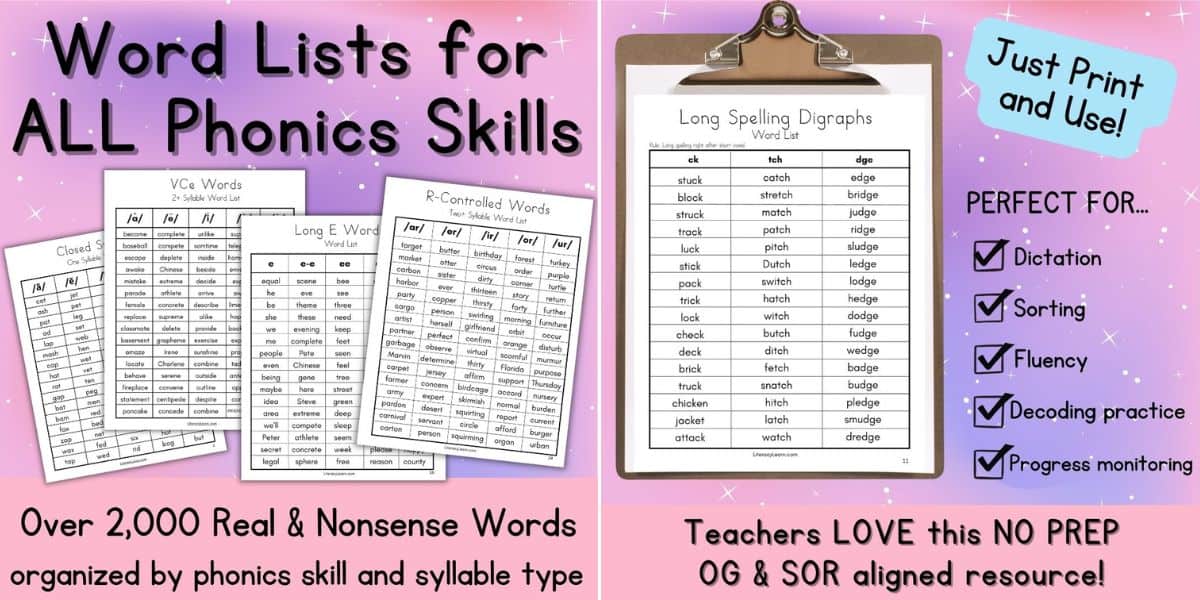
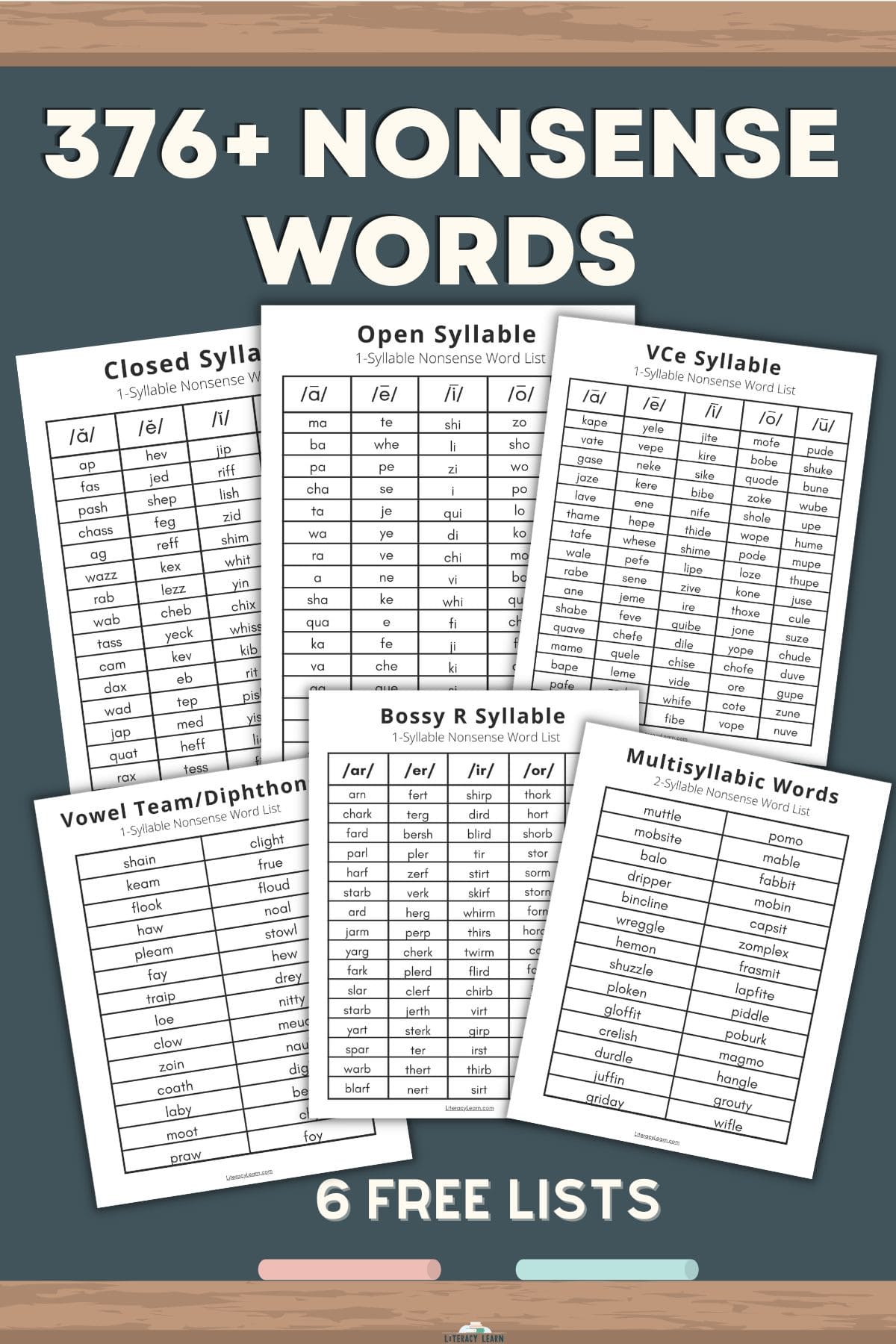
🖨️ Download & Print
We’d love to hear about your experience using these word lists!
Please leave a comment below or tag us on Instagram @literacylearn.
DOWNLOAD TERMS: All of our resources and printables are designed for personal use only in homes and classrooms. Each teacher must download his or her own copy. You may not: Save our files to a shared drive, reproduce our resources on the web, or make photocopies for anyone besides your own students. To share with others, please use the social share links provided or distribute the link to the blog post so others can download their own copies. Your support in this allows us to keep making free resources for everyone! Please see our Creative Credits page for information about the licensed clipart we use. If you have any questions or concerns regarding our terms, please email us. Thank you!

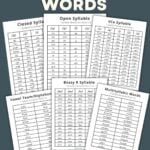
Thank you for the word lists! This will be a great resource to use when working in small groups with students!
Hi Cyndee,
So glad you can use this list! We love knowing that our resources help real teachers and benefit students <3
-Katie and Laura
Such a wonderful resource! Thank you so much
Hi Jamie,
So glad you can use these nonsense words and find them helpful.
XO Katie and Laura
Great work to give us such a wonderful list of words. Thanks a lot. It was very helpful for teaching my grand daughter.
Hi Mini,
We are so glad this list helped assist you in instructing your granddaughter.
Katie & Laura
Thank you for making these so easily accessible for educators!
Stefani,
You’re welcome! We are so glad you can use them with your students.
Katie and Laura
This is a wonderful resource to help with my students!
Stefani,
We are so glad to hear this!
Katie and Laura
What an excellent site and tremendous effort to help educators and parents. Being an educator I know what it takes to create resources and then share them for free. I heartily appreciate your work.
Hi Hira, Thank you so much for the kind words. We are thrilled that our resources are helpful for teachers like you! 🙂
Such a wonderful resource! Thank you so much for making these available to us!
Hi Aniko,
We are so glad you are able to use these lists!
Katie & Laura
I love, love, love them! Very useful for my homeschooling. Thank you very much for sharing.
Sophie,
Thanks so much for the positive feedback. We are so glad you can use them with your children.
Katie and Laura